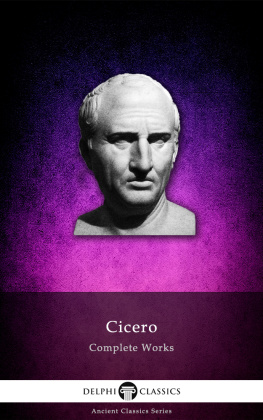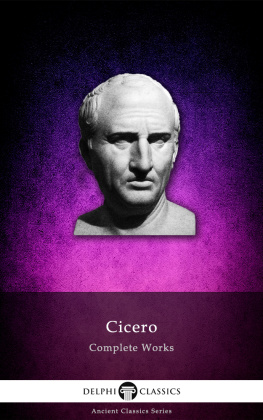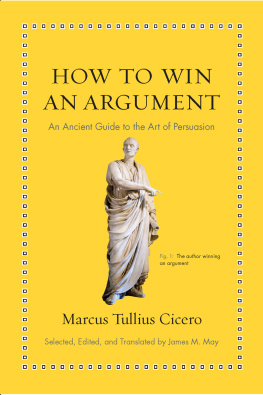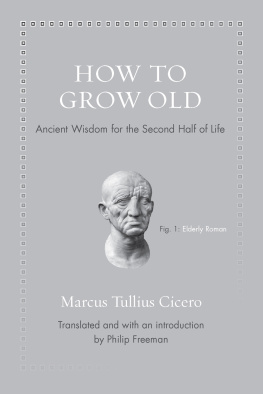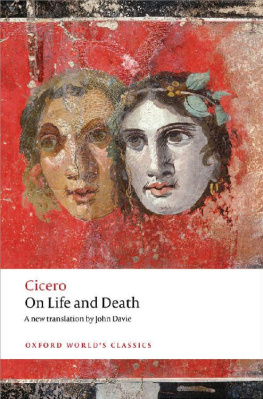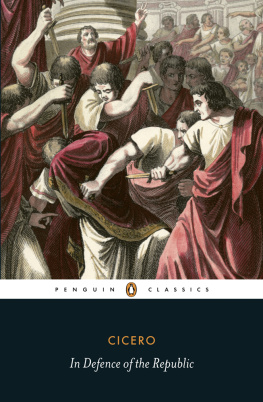
SELECTED POLITICAL SPEECHES
ADVISORY EDITOR: BETTY RADICE
MARCUS TULLIUS CICERO (10643 BC), Roman orator and statesman, was born at Arpinum of a wealthy local family. He was taken to Rome for his education with the idea of a public career and by the year 70 BC he had established himself as the leading barrister in Rome. In the meantime his political career was well under way and he was elected praetor for the year 66 BC. His ambitious nature enabled him to obtain those honours which would normally only have been conferred upon members of the Roman aristocracy, and he was duly elected consul for 63 BC. One of the most permanent features of his political life was his attachment to Pompey. As a politician his notable quality was his consistent refusal to compromise; as a statesman his ideals were more honourable and unselfish than those of his contemporaries. Cicero was the greatest of the Roman orators, possessing a wide range of technique and an exceptional command of the Latin tongue. He followed the common practice of publishing his speeches. In addition to the great influence these have exercised on subsequent European thought, they are of profound intrinsic interest, as the selected works in the present volume reveal. The information that they give us about contemporary social and political life is greatly increased by his letters, of which we have 900, published posthumously. They reflect the changing personal feelings of an emotional and sensitive man. His deeper thoughts are revealed by a considerable number of writings on moral and political philosophy, on religion and on the theory and practice of rhetoric.
MICHAEL GRANT has been successively Chancellor's Medallist and Fellow of Trinity College, Cambridge, Professor of Humanity at Edinburgh University, first Vice-Chancellor of Khartoum University, President and Vice-Chancellor of the Queen's University of Belfast, and President of the Classical Association. Writings: translations of Cicero's On Government, On the Good Life, Selected Works, Selected Political Speeches and Murder Trials, Suetonius The Twelve Caesars and Tacitus Annals, and he revised Robert Graves's edition of The Golden Ass by Apuleius, all for Penguin Classics; Roman Literature (Penguin); The Climax of Rome; The Ancient Historians; Gladiators; Latin Literature and Greek Literature; Cleopatra; The Jews of the Roman World; Roman Myths; The Army of the Caesars; The Twelve Caesars; The Fall of the Roman Empire; Cities of Vesuvius; Saint Paul; Jesus; History of Rome; The Etruscans; Greek and Latin Authors 800BCAD1,000; The Dawn of the Middle Ages; From Alexander to Cleopatra; The Roman Emperors; Greece and Rome: Guide to the Ancient World; The Rise of the Greeks; The Classical Greeks; The Visible Past; Greeks and Romans: A Social History; Readings in the Classical Historians; Julius Caesar; Nero; The Antonines; Art in the Roman Empire; The Severans; History of Ancient Israel; The Founders of the Western World; The Emperor Constantine; From Rome to Byzantium and Collapse and Recovery of the Roman Empire.
PENGUIN BOOKS
Published by the Penguin Group
Penguin Books Ltd, 80 Strand, London WC2R 0RL, England
Penguin Putnam Inc., 375 Hudson Street, New York, New York 10014, USA
Penguin Books Australia Ltd, 250 Camberwell Road, Camberwell, Victoria 3124, Australia
Penguin Books Canada Ltd, 10 Alcorn Avenue, Toronto, Ontario, Canada M4V 3B2
Penguin Books India (P) Ltd, 11 Community Centre, Panchsheel Park, New Delhi 110 017, India
Penguin Books (NZ) Ltd, Cnr Rosedale and Airborne Roads, Albany, Auckland, New Zealand
Penguin Books (South Africa) (Pty) Ltd, 24 Sturdee Avenue, Rosebank 2196, South Africa
Penguin Books Ltd, Registered Offices: 80 Strand, London WC2R 0RL, England
www.penguin.com
First published 1969
Reprinted with revisions 1973
Reprinted with a new bibliography 1989
Copyright Michael Grant Publications Limited, 1969, 1973
Bibliography copyright Michael Grant Publications Ltd, 1989
All rights reserved
Except in the United States of America, this book is sold subject to the condition that it shall not, by way of trade or otherwise, be lent, re-sold, hired out, or otherwise circulated without the publisher's prior consent in any form of binding or cover other than that in which it is published and without a similar condition including this condition being imposed on the subsequent purchaser
INTRODUCTION
CICERO'S political speeches remain immensely important for a variety of reasons. They are a mine of information about one of the most significant periods in the history of the world. They are transcripts of the most successful and persuasive oratory ever delivered, belonging to an age when oratory was the major activity of civil life and the nucleus of the educational system. They help to reveal the man who was this preeminent orator and who also played a prominent part in the seething, ominous political scene, a person of extraordinary character whom we are able to get to know intimately. Moreover, his works have continued to exercise a decisive influence on the minds of men throughout the intervening ages.
The following table indicates the principal landmarks in Cicero's life and the dates at which the speeches translated in this book were delivered.
106 B.C. | Cicero born at Arpinum, sixty miles south-east of Rome |
c. 97 B.C. | Moves to Rome with his family |
8987 B.C. | Attends lectures on law, philosophy and rhetoric |
c. 84 B.C. | First extant rhetorical work |
c. 81 B.C. | First speech (under Sulla) |
7977 B.C. | Attends lectures at Athens and Rhodes |
70 B.C. | First major political speeches |
6844 B.C. | Letters to Atticus (XVI books) |
66 B.C. | On the Command of Cnaeus Pompeius: In Support of the Manilian Law: before the Assembly |
63 B.C. | Consul. Against Lucius Sergius Catilina (four speeches; first and fourth before the Senate, second and third before the Assembly) |
62 B.C. | In Defence of the Poet Aulus Licinius Archias: before a court |
5857 B.C. | Exiled (First Triumvirate had started 6059) |
56 B.C. | In Defence of Marcus Caelius Rufus: before a court |
52 B.C. | In Defence of Titus Annius Milo: before a court |
46 B.C. | In Support of Marcus Claudius Marcellus: before the Senate (after the death of Pompeius following the battle of Pharsalus against Caesar in 48) |
44 B.C. | First Philippic against Marcus Antonius: before the Senate (after the murder of Caesar) |
43 B.C. | Death of Cicero (proscribed by the Second Triumvirate) |
These sixty-three years were fateful for the history of the world. The Roman empire had achieved a position which was unprecedented and has never been repeated: it had established control over the entire Mediterranean area. But Rome was showing itself more and more incapable of governing this vast territory. Administrators were corrupt, Italy itself was reft by an ever-deepening gulf between rich and poor and by a too grudging enfranchisement policy. The machinery of government at Rome, designed for a small Republic, had proved woefully inadequate for the guidance of a huge empire. Politics was a selfish and ruthless struggle among aristocratic groups and grandees and business concerns (knights), each with their hordes of hangers-on.
Next page

